Green Mountain Anarchist Collective
Neither Washington Nor Stowe
Common Sense For The Working Vermonter - A Libertarian-Socialist Manifesto
2014
Note On The Third Revised Edition
Note On The Second Revised Edition
The Yoke of Washington and Wall Street
The Worth of Labor and Exchange
Note On The Third Revised Edition
This edition is intended for print ten years after the original. We have kept most of the text as it appeared in 2004 and then in 2007. One difference is changes to the chapter “Self Determination For The Abenaki.” On this issue our views have evolved, and this is reflected herein. We have also added some footnotes and other minor changes to update some basic points as the social and political developments in Vermont demand. Despite the revisions seen in this edition (and those seen in the 2007 edition), our basic views have remained the same. Vermont continues to be a unique, democratic, and progressive place along the Northeastern fringe of the American Empire, and we remain committed to cultivating these qualities in order to bring about the full bloom of liberty. We, as fellow Vermonters, invite you to agree. Together we will win!
-The Green Mountain Anarchist Collective, 2014
Note On The Second Revised Edition
(As Printed in The 2007 Version) This second edition of Neither Washington Nor Stowe has been greatly expanded and revised. We understand this edition to be more comprehensive than previous editions. However, the original document was written and published in 2004. At that time the Montpelier Downtown Workers’ Union (MDWU) was organizing across the capital and was winning real power for working people in strides. Since then, for reasons which are beyond the scope of this document, the union has folded and exists only in memory. In other words, there have been changes in Vermont’s social movement since 2004. With this in mind we have tried to update the document where we can or at least insert dates and years as reference points for events or organizations. Even so, the sections on the MDWU remain, more or less, as written in 2004. We have decided to retain them as they map out a realistic model for future organizing.
-The Green Mountain Anarchist Collective, 2007
Introduction

“Man is truly free only among equally free men; the slavery of even one human being violates humanity and negates the freedom of all.” -Michael Bakunin
Northern Vermont 2004 [and Revised 2007 & 2014] -As Vermonters we are perhaps the most weather conscious people in North America. We feel the winter winds through the drafts of old farm houses, smell the melting snow when collecting our sap buckets, hear the birds of summer while tending our farms and gardens, and see the beauty of fall written across the hills in oranges, reds, and yellows. Many of us still work with our hands, be it as loggers, farmers, carpenters, midwives, or crafts-people. When the leaves fall we still hunt deer, and many of us still cut our own firewood a year in advance. Even the many of us who live in town still grapple with the dirt roads during mud season, and swim in country lakes during the warm months. We know our neighbors, drink cider and beer around campfires, and during the first Tuesday in March, we still debate and vote at Town Meeting. We, for the most part, have maintained this way of life despite the over development, consumerism, and government centralization that has plagued much of the continent. We maintain this, in part, for reasons beyond ourselves. The rugged terrain of the Green Mountains and near arctic winters limits our potential for certain forms of development, while also shielding us from less hardy outsiders. Because of this remoteness our Green Mountains often feel a century away from Boston, and a million miles from New York. Yet we are still tangled in the treacherous web of Washington politicians and the wealthy elite from Wall Street, to Texas, to Stowe. We are our own people, yet we are compelled to mimic the same bureaucratic structures in our government and economic dead ends in our communities that strangle the common working person from California to Maine.
A Peoples’ History

The History of Vermont is one of independence, democracy, and justice. In the 1700s, we, as common farmers, successfully fought our own war of independence against New York, and then later, the British Empire. In our early years we achieved sovereignty based on a directly democratic, more empowered, Town Meeting system and continued as an independent republic for 14 formative years. We were the first state to guarantee its citizens the right to vote, even when they were not landowners, and we never allowed slavery. From the Green Mountain Boys, to the underground railroad, to those who volunteered to fight against slavery in the Civil War, to those who battled against Fascism during and before World War II, we have never shirked our responsibility in fighting the good fight, when we have deemed it such, and when the call has come. In a word, we are a people who dare to lead both by example and struggle.
More recently, we have lead the nation on such basic issues as providing healthcare for children, raising the minimum wage, civil unions, legalization of medical marijuana, mandatory labeling of genetically modified seeds and food, and we are the first State in the Nation [2006] to elect a Socialist, Bernie Sanders to the U.S. Senate [1]. Vermont is also the only U.S. State with a strong and viable Third Parties [as of 2014, the Social-Democratic VT Progressive Party has 10 persons elected to the VT House & VT Senate, as well as one person elected to Statewide office: Doug Hoffer as State Auditor]. In addition, the far left VT Liberty Union Party is also considered a Major Party. Being in front of other regions, demanding more for the common good than the poverty of global capitalism normally allows for is both our birthright and historical calling. But being a pace in front of a slow runner is not good enough to guarantee the maintenance of our way of life nor the emergence of a freer, equitable society beyond the shackles of international corporations and their two national political parties.
In a word, while the goddess of agriculture still looms above the State House, our farms are quickly disappearing. From 10,000 family operated dairy farms a generation ago to only 1,200 today [2004], “free trade” and the corporate takeover of agriculture have driven us to fight for the very survival of this dignified way of life. Our once powerful manufacturing base, which formally included highly productive machine shops from Brattleboro to Springfield to Newport has faded, moving to the super exploited markets of China and Mexico. To fill the void, the tourist industry (ski resorts, hotels, retail shops, restaurants, etc.) has emerged as a major employer. Unfortunately, this shift has emerged as the mass substitution of dignified, good paying jobs with benefits (the type that you can raise a family on) for those that pay close to the minimum wage, carry few if any benefits, and demand that us working Vermonters smile, dance, and entertain those upper middle class and wealthy out of state tourists who view Vermont as little more than their quaint New England theme park.
So the question becomes, where are we now? If we retain our current trajectory will the Vermont we leave to our grandchildren resemble that which we were raised in? Will farms still dot our hills, or will our red barns be replaced with more ski resorts, chain stores, and inns for the rich? If the latter becomes true, we must recognize the fact that future Vermonters will be compelled to get by on no more than minimum wage, little or no healthcare, and the confines placed on our tradition of democracy by corporate control and federal dictates. The bottom line is that we, as the majority, are standing at a crossroads at which we can choose the path of capitalist homogenization, or, rather, lead the way back towards direct democracy, local control, and the social advancement of the common good.
The Yoke of Washington and Wall Street

The United States of America, and much of the remaining world, operates above all else according to the rules of capitalism. Under capitalism, the basic goal of society becomes the private accumulation of wealth for the elite few. In other words, the major institutions of society value the production of goods and services that are capable of generating a maximum amount of profit. What is best for the common good is often obscured by what is considered best for economic consumption. With such, working people (who are by far the vast majority of the population) are seen simply as a necessary resource for corporations and private owners. Instead of viewing workers and small farmers as equal members of the broader society, the owners and bosses see us as no more than a necessary resource in the field of production. In a word, we’ve become akin to the machines- we’ve become objects of exploitation.
Our labor is used not as a means to uplift society as a whole, but as a tool to make a select few very rich. On the job, we are often compelled to work under the near dictatorship of the boss. Even when we work for ourselves, we are still dictated to by the wealthy that hire us, the corporations who subcontract us, as well as the ebb and flow of the capitalist economy. In short, we are compelled to engage in work in order to create a massive overall profit that we will never see, and if we don’t like it, and we speak up, we face the likelihood of being fired. The schools teach us that this is democracy. For forty to sixty hours a week we live under a dictatorship in our workplaces, and this is acceptable?
Insofar as social and economic policy is concerned, the federal politicians, who are usually bought and paid for by the rich, don’t ask what we think or what we want. Instead they take into account the “needs” of the owners. They pass legislation that makes the rich richer and the poor poorer, and adopt trade agreements that translate into the foreclosure of family farms and the relocation of factories to countries and states where workers have even less rights, and where wages are even lower than they are here. And again, these politicians write laws that allow the rich to skip out on paying their share of taxes, and instead rely on us working class folk to foot the federal bill. And what do we receive in exchange for such taxes? Healthcare? Affordable housing? Free higher education? No. Our money is used, by and large, to subsidize the corporations, and to build bombs and tanks that are deployed at the whim of the President and in the interests of the elite [2].
Even in the larger picture we are being screwed by the out of state corporations and the feds. While we struggle to get by on the sweat of our labor, our raw materials (milk, timber, granite, produce, tourist monies, etc) are, on the one hand, shipped out of state for refinement and then shipped back to be sold to us at a profit that we will never see. On the other hand, much of the accumulated capital, from among other things, the tourist industry is carpeted off to banks and rich people who have never even stepped foot in the Green Mountains. In this way, Vermont has the same economic relation with the U.S. as that of a colonial possession. Just as the American Colonies (and much of the world) came to understand such a colonial relationship to be detrimental to the social, economic, and political well-being of their citizens, so too do increasing numbers of conscientious Vermonters.
In essence, the federal government demands that we provide them with money, send our children to die in their wars, sacrifice our rights for the profit of the few, and to do so without complaining. This is the directive of Washington DC and Wall Street, and this is the yoke which is placed over the neck of the working people of both Vermont, the rest of the nation, and much of the world. So do we learn to live with this yoke, or should we seek to break it–once and for all?
The Yoke Within
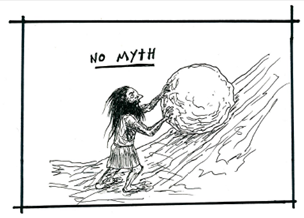
As if it wasn’t enough, to have the federal government and big business on our back, we also have foes closer to home. The greedy capitalists that own the resorts, the yuppies that we have to wait on, managers that run the factories; these are the daily reminders that we’re forced to work within the confines of the U.S. economic machine.
For example, let us take a look at the case of Stowe. Nestled on the busy thoroughfare of Rt. 100 and in the shadow of Mount Mansfield, this quaint village represents, to many of us working Vermonters, what is wrong with the current set up. Million dollar second homes for the wealthy of Toronto, Connecticut and beyond dot the hills. Workers from Morrisville, Hardwick and Elmore make the daily trudge to labor in the tourist shops that line Main Street, to staff the ski resorts, to manicure the lawns of the rich, and wait on them hand and foot at their catered parties. This Vermont theme park for mostly rich out-of-staters has grown so large in its scale of operation that hard working people of the surrounding towns cannot perform all of the necessary labor to keep the lazy rich people content. Hard working folk from Jamaica and other countries are recruited to staff the tourist industry. Young working people, who travel around the country working at resorts just so they can afford to ski or snowboard, sell themselves into a glorified form of indentured servitude for a season. Working people from around the country who immigrate to our Green Mountains for their beauty and quiet end up facing the ugly crowds of the tourist buses and their shrill chatter while ringing them up at the register.
In this poker game we see the workers whose cards leave them with only their wits to play the game, and the wealthy flatlanders always with a royal flush in hand; but there is another character whose hand is at play and who shuffles the cards to keep the deck stacked against the common Vermonter. That is to say, there is the local elite who own the hotels, the restaurants, the big landscaping companies, the real estate firms, the car dealerships. There is a local status quo in power in Stowe and Montpelier, in Brattleboro and Killington, and throughout Vermont who profit off the maintenance of this system of exploitation and inequity. While they play real hard at trying to maintain the image of regular good ol’ Vermonters just like everyone else, their interests (and profit margins) lie more in tune with the wealthy, both here and out-of-state, than with us workers, be we Vermont born and raised, or recent arrivals to the Green Mountains.
Here is the picture: A small dairy farmer signs off on the foreclosure of a family farm as old as the independent Republic of Vermont while an entrepreneur in Stowe celebrates the acquisition of a new shop at which common Vermonters will labor for poor wages to make him richer. A Vermont National Guardsman in Iraq gets blown up by a bomb while a member of The Cody family (owner of several Washington County car dealerships among other businesses) sits comfortably and safely behind a desk as a Four Star General in the US army. A carpenter hitchhikes to the jobsite because he can’t afford to get his car fixed until next week, let alone pay for the skyrocketing gas prices, while “caring” capitalists Ben and Jerry make a shitload selling their company to the multi-national corporation Unilever. Our good ol’ boy Governor Jim Douglas gives $350,000 of our tax dollars to the ski industry to subsidize their advertising costs while he scolds dairy farmers asking for a $500,000 investment to buy their own dairy processing plant. [*circa 2004] The liberal led government of Burlington does some remodeling to bring in department stores and fancy boutiques while a family in the old North End has to sell off their home because yuppies have driven up the property taxes.
There are, in fact, two Vermonts: one of wealth and privilege and one of hard work and sweat. If Vermonters have any chance of success against the forces of Washington and Wall Street, the battle must start in our own backyard against the business and political elite of Montpelier and Stowe. We must guard against the sly maneuvers of both the conservative and the liberal status quo in Vermont, and fight to win more power for ourselves in our towns and workplaces. Could our efforts ever cultivate a harvest hardy enough to withstand the strong, cold winds of Washington and Wall Street if we do not till our fields first? Can you start a good sugaring season without first cleaning out your sap buckets? The answer is no. There will be no victory over the enemy without before there is victory over the enemy within. For it is the privileged and powerful locally and their dupes who will stand as the first serious line of defense for the privileged and powerful classes in general. So do we bow our heads, mutter curses under our breath, and continue to subsist on the scraps they throw to us or do we dare to struggle and dare to win against the local elite?
A Second Vermont Revolution

So, what is to be done? We can choose a different way; a way that will allow our grandchildren to experience the independence, democracy, self-sufficiency, and natural beauty that are the gifts handed down from our common ancestors. If we choose this path to freedom, we can set our course in such a manner that our future will not be simply a still life of the past, but one that reflects new possibilities for equality, direct democracy, and social stability. There is no reason in the world that we cannot both honor the past, while paying homage to a future wherein all Vermonters are allowed, among other things, free access to healthcare, higher education, housing, childcare, and decent jobs. This is the trick; remaining true to our roots while capturing the spoils of technology and the potential of social cooperation. So what would such a Vermont look like, and how do we get there? Well, the seed of such a place is already in our hearts, and through such, has already begun to show signs of germination.
Back in the 1700’s, before Vermont was a state, we practiced a form of direct democracy through an empowered Town Meeting system. Imagine for a moment that the legislature didn’t meet in Montpelier. Imagine, in fact, that there is no legislature at all. Instead envision a system working throughout all the Green Mountains whereby all major decisions are made through local Town Meetings. Now of course one, or two, or even 30 Town Meetings don’t have, nor should they have, the power to impose their views on all of us. However, would it not be more representational of our collective general will if a majority of towns voted to pass a certain regulation, law, or resolution? Well, that is how the early years of Vermont were defined and that is how the great American revolutionary Thomas Paine believed it should be. In other words, we used to all get together in our different communities in order to discuss, debate, and publicly vote on all the big issues that affected Vermont as a whole. And if a majority of towns passed something, it was considered a done deal. And again, the way in which they tallied votes was to have representatives of every town meet in order to report what the majority of their community felt was best.
Of course, Vermont is a different place than it was back in 1776. No longer are the majority of us small farmers, and therefore our own bosses. Today, Vermont is a place where most of us work for someone else, and where the remaining farms have to struggle to remain viable in the larger capitalist world. In short, Vermont, like nearly everywhere else in the modern world, is a society divided by economic classes, and again by the interests of the large population centers, like Burlington, as opposed to the small rural communities. Therefore, the rebirth of our tradition of direct democracy would have to take these factors into account.
Town Meeting
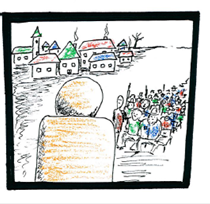
We have witnessed the reinvigoration of our Town Meeting system since the 1980s. What began as towns passing resolutions against the perceived dangers of nuclear weapons has grown into a widespread movement of communities taking stands on any number of issues. Now a days it is common for us to pass resolutions for or against any number of issues; be it against GMO foods, for or against Vermont Yankee Nuclear Power Plant [closed down in 2014], in support of the Bill of Rights (and against the USA PATRIOT Act), in favor of wind power and other renewable energy sources, in favor of universal health care, for the impeachment of the US president, in favor of pulling the VT National Guard out of Iraq, etc. These resolutions have been declared “non-binding” by the state government and are viewed by some simply as a way for common people to make their views known to the General Assembly. On the other hand, the statewide debate over Act 60 (the law which is intended to provide poorer children as good an education as rich children) witnessed a remarkable chain of events. During the height of the debate, a small number of wealthy towns (West Dover, Stowe, etc.) voted to withhold their property tax money from Montpelier while they were fighting to restore the old system. These rich towns were generally motivated by self-interest and greed (not wanting “their” money to be spent on text books for lower income children in Hardwick, etc.), but at the same time, their actions demonstrated a new emerging resolve among towns to reassert their own sovereignty over that of the Capital.
The future re-establishment of direct democracy in the Green Mountains will, in a large part, rely on the extension of the power of Town Meeting, though be it a power aimed at utilitarian ends – not economic chauvinism. But how will this be achieved? One thing is clear, the politicians in Montpelier will not simply hand it to us. Our only chance at winning will be through the coordination of a statewide movement, based in the towns, which seeks to extend our local authority with or without the approval of Montpelier. Imagine if you will a statewide effort to place a resolution on the majority of Town Meeting agendas which declared that:
‘When and if fifty percent, plus one, towns/cities representing a majority of Vermonters pass any given resolution, all local revenue and cooperation will be withheld from the State government until such time as that resolution becomes the common practice of the land.’
It will be through such an effort that we will begin to reclaim our democratic traditions that have been obscured through 200 years of capitalist centralization and upper class domination of the political system. In order for us to do this, we must begin to bring such self-empowering resolutions to our various Town Meetings. We can do this individually, town by town, or through the formation of a large non-sectarian coalition of those networks of Vermonters, Rural Vermont, the anti and even pro Vermont Yankee groups, the anti-Patriot Act organizations, the anti-war coalition, which are already mobilized and capable of getting resolutions placed on a good many Town Meeting agendas. Would such an empowered Town Meeting system translate into a direct democracy in and of itself? Given the modern basis of our economy, as well as the diverging interests of the remaining farmers, and other working class people, it would seem reasonable that such an empowered town meeting system would only be one part of the equation. If we are to truly and honestly help build a freer and democratic Vermont, we would do well to find ways to extend this direct democracy to the farm and the workplace.
The Farmers
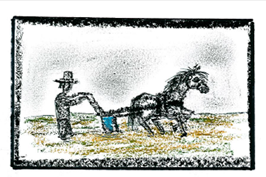
Farming has always been a part of our culture. Let us remember that the legendary Green Mountain Boys, who were the scourge of New York authority and the British at Ticonderoga, were no more than small farmers themselves. In our past it was these homesteaders who, when needed, banded together to fight the good fight for the common cause. Today their struggles tend to be against the large capitalist agribusiness. Where they once fought Red Coats and Sheriffs, they now fight against the unfair trade policies of NAFTA, the FTAA, and federal and state politicians who time and again sell them out to their capitalist underwriters. Only one thing remains the same…they are still fighting for their free existence.
While we have lost many farms throughout this long fight, those that remain have begun to organize. To date, over 300 farms have come together to create the Dairy Farmers of Vermont (DFV). This group represents a staggering eight hundred and fifty million pounds of raw Vermont milk (or one third of all that is produced in the state). DFV, which was formed in an old barn in the Northeast Kingdom, is presently fighting for the rights of Vermont farmers generally, for higher wholesale prices (with the aid of organized labor), and as of the fall of 2006 has opened a farmer owned dairy processing plant in Hardwick called the Vermont Milk Company. In line with our traditions, DFV operate according to directly democratic principles. In other words, no decisions are final until they are brought before a vote of all the members. And here the rule is one farmer, one vote. Likewise, their processing plant, which pays farms several dollars more per hundred weight for raw milk than their corporate counterparts, is run democratically by farmers themselves through a farmer board of directors.
Whereas it is way too early to know the full extent of what victories DFV will ultimately win, and although we cannot say for certain how this organization will grow in the coming years, we can say this: the more farmers are organized, the more power they will have when confronting corporate America. In the past, when most Vermonters grew crops and kept livestock, we could count on Town Meeting to voice their unique concerns and interests. However, because of the changing economic landscape, we cannot do so now. Today, many farms are isolated in communities that increasingly rely on tourism and other industries for jobs and revenue. Therefore, farmers’ voices are often drowned out in the multitude of other perspectives. For this reason we need to support such democratic farmers’ groups as DFV. As long as we value this important link to our past, and as long as self-reliance remains a Vermont ideal and goal, we must support those emerging institutions that fight for the preservation of local, small, agriculture. And besides, if one of our goals to provide healthy food for ourselves and our children, should that food not, when possible, be cultivated right here where we can both watch it grow and take pride in knowing those who produce it?
We may agree that all this is desirable, how does it relate to the broader picture of a more free and democratic Vermont? Well, the present course of the DFV, and other like-minded farmer groups, is similar to what we see happening in the Town Meeting movement. These groups are the nucleus of democratic change, and, by virtue of their existence, demonstrate the potential for expansion. It is conceivable that the DFV or a future organization will extend their membership to other farmers (not just those in dairy). And imagine, if you will, that after winning more concrete gains they were to reorganize themselves into local, countywide sections. Each one meeting several times a year and operating, like Town Meeting, according to directly democratic principles. Let us imagine that such an organization began to develop strong means of communication with the Town Meeting movement. Could we not expect such an organization to eventually run and regulate agriculture on a local and statewide basis the same way that an empowered Town Meeting system would give voice to the concerns of the residents of local communities? From our standpoint, the answer must be a hardy yes!
Of course, such a direct democracy of agriculture would have to be solidly based on a just foundation. Therefore the individual farms would do well to be managed democratically with all those who work the land and machines being themselves empowered to articulate the relations in which they labor. And here let it be clear that we do not call for something that is very different from our current practices. Is it not true that most our farms are worked by a single family? Don’t the adult members of those families already operate according to the natural give and take of family decision making? Would not these small farms who currently hire a few field hands be stronger by incorporating their ideas, perspectives, and energy more thoroughly into the operation? The answer to these questions are again yes. If we achieve such democracy, both directly on the farm and in the countywide organizations, we will be well down the road of achieving real democracy across Vermont. However, for this saga to begin to reach completion we would have to first also address the concerns of those who labor off the farms, in the factories, in the shops, and on construction sites. For if the democracy we envision ends in the Town Halls, and on the farms, many of us would still be left in the shadow of alienation of servitude during the near daily nine to five.
The Workplace
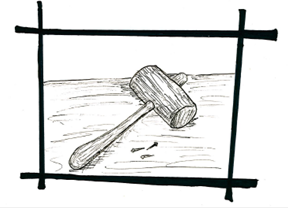
When most Vermonters were farmers, many of us belonged to the local Grange. Today, most Vermonters work in other industries, and many of us belong to unions. Right now tens of thousands of us are union members. Of Vermont’s total population of just over 600,000 it is estimated that 100,000 people are either union members, retired union members, or immediate family members of the two. More than 10,000 state workers and retirees belong to the VSEA. 10,000 more belong to AFL-CIO, including many ironworkers, plumbers, writers, factory workers, communication workers, carpenters, and nurses. The independent United Electrical, Radio and Machine Workers (UE) claims hundreds of members across these mountains, and the National Educators Association (NEA) claims thousands more. In a word, large sections of working Vermonters are organized across the region in numerous sectors. And again, over the last decade many of these unions have come together in the spirit of mutual aid by becoming members of the Vermont Workers’ Center coalition.
The Worker’s Center, like the Dairy Farmers of Vermont, and in the tradition of Town Meeting, operates as a democratic organization. Affiliated members (unions, some social justice groups, and individual working class people) have a vote on a steering committee that sets the priorities and political positions of the center [3]. Here, under one big tent, working people are able to come together in common cause in order to fight for that which the capitalist economy is loath to grant them: better pay, more democracy at work, and social justice has become not just the struggle of isolated people or separate unions, but the common fight of an increasingly united working class. And as this spirit of solidarity has been kindled among worker organizations, it has had a reverberating effect upon the elected union leadership. In 2003 the Vermont AFL-CIO elected a reform, pro-democracy, candidate to serve as State President [4].
However, as Vermont’s manufacturing base has eroded due to corporate greed and the federal policies of so called free trade, this sector has been increasingly replaced by low paying service and retail jobs. And here, union concentration (and decent wages and benefits) has been seriously challenged. This shift in the economy of course presents a unique set of challenges to the Vermont working class movement.
In response to this the Vermont Workers’ Center in cooperation with the UE helped to launch a historic citywide union drive aimed at the 800 service and retail workers of the capital city. In 2003 the Montpelier Downtown Workers Union (UE Amalgamated Local 221) was formed, and today the union has won contracts in two shops, is promising two more by the fall, has members in more than a dozen other shops, prints a monthly newspaper for area workers, and has established a citywide steward system and grievance procedure [5].
Like Town Meetings and DFV, this young and innovative union has organized itself as a truly democratic voice in the community. Instead of taking the dictums of the bosses at face value, they have begun to create a directly democratic space through which workers are free to hold meetings of their own, and therefore begin to decide how they think things should be run. The days of politicians, the rich, and the Chamber of Commerce calling all the shots may be numbered after all.
In April 2004, the union held a Workers’ Town Meeting at which union members from more than a dozen different city shops participated. At the meeting, the working conditions of the area service and retail sector were discussed, as were various strategies for how they could advance their social visions and economic demands. It was there that members debated and then democratically voted to establish the citywide grievance procedure, and to form a Workers’ Defense Squad. These facets of the union are now beginning to be utilized by workers across Montpelier as a means of building further democracy, fighting the bosses, and gaining social respect. Tellingly, the Defense Squad, which in principle is the direct action wing of the union dedicated to supporting the grievance procedure, is made up of not only members of the Downtown Workers’ Union, but allied members of other area unions such as the Carpenters, the Teamsters, the Nurses, the NEA, and the Printers (all of which are members of the Workers’ Center coalition).
While this new union still has far to go on the road to the empowerment of the Montpelier working class, it cannot be stressed enough that their initial successes carry positive ramifications for workers across Vermont. As word of their victories spread throughout the hills, it is possible that workers in other cities and towns will follow suit. And as they begin to build such democratic unions across the state, there can be no doubt that the voice of the common woman and man will begin to eclipse that of the politicians, landlords, and wealthy [6].
Okay, so the question again becomes, exactly how does the building of new democratic worker organizations, and development of inter-union solidarity relate to the overall task of transforming Vermont for the better? Aside from the fact that unionized workers have job security, better pay (on average), and more democracy on the job than their nonunion counterparts, the above discussed developments in the labor movement seem to point to a broader trend. First of all, the more established unions are becoming open to more internal democracy. Second, the example of the Montpelier Downtown Workers’ Union shows the potential for building new, directly democratic unions among the ranks of low paid workers. And third, the emerging sense of organized class solidarity would seem to allow for a more dynamic labor movement then could previously be expected. These three developments point to new possibilities. Case in point is the recent rise of worker cooperatives across the state, of which there are currently 10 intermittently located between Brattleboro in the south, and Burlington to the North. [*circa 2006]. Could this not be a sign of a future that is yet to take full form? [7]
Even so, could it not be argued that when and if the Town Meeting system is further empowered that us workers will no longer need the protection of labor unions? This, in that they as the majority class, will be fairly represented through their communities. While it is true that workers are the majority, it is also true that many towns, like Stowe, entail hundreds of workers who do not, and/or cannot live where they work. Therefore, in order to give a voice to those, who by their labor, make the functioning of that community possible, we must recognize the absolute need for the integration of worker organizations with the Town Meeting system. Union plus Town Meeting equals Democracy! In addition, it is hard to imagine a situation where the power of Town Meeting and farmer organizations are effectively expanded without the further maturity of the Vermont labor movement. In a sense, for any one of these interests to have a chance at superseding the power of the rich and that of the General Assembly, they must all develop together, as supporting beams of a united and popular movement. While the towns have the power to withhold cooperation with the centralized government, and the farmers the strategic ability to control local food production, us workers, through our organizations, have the all-important ability to withhold our labor. Without our participation, NOTHING in Vermont, or the world for that matter, other than the rising and setting of the sun, could continue to function. Without our participation capitalism and the system of government that has come to underwrite it, would crumble.
With this being said, after the Downtown Workers’ Union or future like organizations reach an advanced level of maturity, they should seek to develop further ties with the rank and file of other unions also located in the same city or town. In the case of the Montpelier Downtown Workers’ Union, maybe this will be partially achieved through the ongoing inter-union work of the Defense Squad. Maybe this squad will eventually develop into an action committee, which does not confine itself to the struggles of local 221. It is possible that it will emerge as a committee that is prepared to take direct action in defense of all Montpelier workers, those from different unions, and those that are yet to belong to a union [8]. And again, as such relations of mutual aid develop, however they come about, is it not possible that some crucial worker related issue will come to the surface which compels all the unions of Montpelier to come together in one great workers’ council? [9] For the moment, the eyes of Vermont are on these workers, and it is up to them to set the example for struggles that have not yet risen to the surface.
As the fight goes on, we shall see what happens. But one way or another workers all across the Green Mountains, would do well to come together in such organizations. In a word, if you work in a nonunion shop, talk with your coworkers and form a union. If you are already in a union, get involved with it, fight to make it more democratic, and if it hasn’t already become a member of the Workers’ Center, propose to your membership that you join today. And of course, while we struggle to win mid-term bread and butter victories for our class, we must seek to integrate unions into local and statewide networks of mutual aid, capable of making political decisions, engaging in effective strategies, and nurturing internal practices consistent with direct democracy. If we achieve all this, could we not assume that it will be us workers who one day will be in a position to self-manage the sectors of the economy we already know so well? Just as we must struggle to create farmer organizations that are capable of coordinating Vermont’s basic food production, we must do what we can to bring more of our fellow workers into the organized fold, while transforming our existing unions from within, into bodies that are capable of holding production together without the exploitive presence of corporate owners and thick headed bosses.
In summation, a good union is no different than Town Meeting; it is a form of Town Meeting that is daily reinforced through activities on the shop floor and finds its larger expression through the integrated efforts of workers across industrial lines. When we were all farmers we met in Town Hall to decide our own fate. Today, all that has changed is that we now work in hundreds of different jobs, often in towns where we do not live, and the communal place where we go to make decisions has come to include our Union Halls. As the fight to regain our democratic freedom comes full circle, we must recognize that it is impossible to recreate the past; one cannot step in the same river twice. Our world has changed, and with it the directly democratic process of Town Meeting must come to include countywide farmer organizations, and integrated worker councils. It will be through these three pillars of democracy that we will again come to know the dignity, responsibility and privilege that comes with a truly free and empowered people.
Freedom and Unity

Town Meeting, democratic farmer organizations, and worker councils; these are the three building blocks of a free and prosperous Vermont. Each of these organizations, both at a local and regional level, would stand for the organized interests of the people. But in and of themselves these organizations do not necessarily translate into a functional direct democracy. If we cannot find a way to tie them all together, we will be left in the quagmire of having three separate, though popular, institutions. If this were the case it can be assumed that they would inevitably compete with each other for overall sovereignty, and in the process they could fail to surmount the powers of Washington, Wall Street, and the State. Let us recall that in a divided house, the tyrant remains king.
Therefore, we must find ways through which all three are integrated into one functioning system. Ideally, each body would represent one vote. For any decision to be made, we could require that two out of three of the bodies vote in its favor. In other words, if a single town, or a small number of adjacent towns sought to pass a resolution that would only affect those communities, we could require that both the farmer organization(s), and the worker councils that exist in those communities also debate and vote on the issue. If two out of three vote in favor, then it should be done. Conversely, the farmer organizations or worker councils could also bring issues to the fore, which the related Town Meetings would have to vote on. And again, when decisions have to be made on a broader level, we can require that all three bodies vote on the question at hand during something akin to a greatly empowered Vermont wide Town Meeting Day. Of course, most members of society will have two votes; one through the town where they live, and the other either in their local worker council or county farmer organization. Therefore, in order for such big decisions to be democratically made, the general meetings of these bodies would have to be staggered. For example, on the first Tuesday of every March, all the towns would hold their meetings. A week later the farmers would hold their county meetings. A week after that, the worker councils would hold their meetings. If a majority of towns, which represent a majority of Vermonters, passed a given resolution then it would register that the towns, collectively, voted yes. If a majority of the county based farmer organizations, representing a majority of farmers, passed a resolution, then it too would be considered a yes vote. And again, if a majority of worker councils, representing a majority of workers, passed a resolution, then it would be counted as a yes vote. There are several options for how resolutions would become law. A Vermont-wide resolution could be considered law if a majority in two out of the three bodies voted in its favor or, perhaps, a free Vermont would require a majority in all three bodies for a resolution to pass.
So how would resolutions be placed on all these agendas? After all, if we are to coordinate all the functioning of Vermont ourselves (without the centralization of the General Assembly), we will have to see to it that certain basic issues are addressed, in every local body all at once, and in a timely manner. With well over 200 Town Meetings, an equal amount of worker councils, and 14 farmer organizations, it is not practical to think that a few committed individuals will be capable of getting enough signatures in each locality to get any single issue on all the local agendas. Furthermore, such a task would have to be performed once, twice, or even four times a year! Assuming that such dedicated individuals did mobilize, is it not likely that dozens of similar, yet competing resolutions would also be placed on the agendas, piecemeal, across the Green Mountains? How could Vermont smoothly function given these inherent difficulties?
First of all, we have to remain vigilant that we do not begin to dismantle the democratic rights of individuals and groups in the name of efficiency. Therefore, as is the case now with towns, people should always be allowed the option of privately getting signatures in their communities in order to get things placed on their local agenda. And if other organizations wish to have specific issues addressed in multiple towns (or for that matter in the farmer groups or worker councils), they should have the right to attempt to do so. However, these means of expression are not enough to guarantee the practical operation of running all of Vermont. For this reason, we should seek to build a system through which any one Town, worker council, or farmer group has the right to ask that a proposal that they, on the local level, endorse, be placed on all the agendas across Vermont. And in order to synthesize redundant proposals, the Vermont wide bodies of the three organizations should annually elect a coordinating committee, who would all work together and whose job it would be to make it so. Such a committee would not have any legislative powers. All they would be empowered to do is rationalize the various proposals that are presented for debate across these hills. In order to discourage the concentration of duties, and partisanship of interests, such persons should not be allowed to be elected onto multiple seats. In other words, a person should not be allowed to run as both a Town Meeting and farmer or labor coordinator at the same time. While such a system seems to solve many problems inherent in directly democratic systems, one operational question remains. As has been alluded to above, under this system free market capitalism would be replaced with a more socially responsible and equitable self-management system. Food production will be rationalized and coordinated through the united efforts of the farmer organizations, and production and services will be carried out through the directly democratic labor unions. One may ask, exactly who within these groups would be responsible for coming up with such a complex and integrated plan? With the farmers, considering that their overall numbers and local bodies will be relatively few, the solution is comparatively easy. During their regular Vermont-wide meeting days, the general membership would be free to set the general goals and direction of such production. After this, an elected, statewide farmer select board will be responsible for the formation of specific plans on how such membership directives will be carried out.
In relation to industrial production, transportation, services, and all else in between, the answer is a bit more complex. While the workers as a whole, through the local worker councils, should be democratically allowed to express their general vision, specific issues within specific industries will have to be addressed by those who labor in those capacities alone. For example, while the general membership of the combined worker councils (in collaboration with Town Meeting and the Farmer organizations) may vote to increase Vermont’s reliance on renewable energy sources [10], it will be up to all relevant workers who will be carrying out the project (utility, construction, etc.) to come up with the exact plan on how this will be done. While workers will be brought together in geographically organized councils, it will also be necessary to retain a parallel trade union structure in order for specifics to be worked out. In essence, this reality is akin to a group of people deciding that they want to have a house built. While the decision to build and the general features of such a house would be left to them, the actual blue prints would have to be drawn up by an architect. In a word, the people as a whole will give direction, and the expertise of the related workers will find a way to make it happen. And again, as with the other popular bodies, these parallel trade-based bodies must operate according to directly democratic principles. Finally, as is the case with the farmers, the workers will have to elect Vermont wide worker select boards both at the council level and the individual trade level in order for the general directives of the combined membership to be carried out according to a detailed and coordinated plan. The last problem that such a directly democratic system would have to solve is how disagreements are resolved between these bodies, and how voting deadlocks could be overcome. Imagine a situation where an important decision has to be made. Let us assume that the nature of the decision does not allow us to simply vote no, but rather that one way or another we have to take some kind of action. Say that the proposal that is intended to address the issue is voted down by both the majority of Town Meetings, and the farmer organizations. If this were to occur, we should require that elected delegates from all the towns, farmer organizations, and worker councils meet in order to discuss the positions of their communities. Such a body would encompass roughly 500 total delegates. While these delegates would not be empowered to make any decisions, they should be expected to discuss, debate, and propose compromises to the issue. In turn, they should seek to come to a commonly accepted position, which they could bring back to their local bodies where it could be again voted on. [*Note: This power dynamic would be the exact opposite as it is today, where the decisions of Town Meeting are considered non-binding, and the decisions of the General Assembly are considered law.] Of course, such a system does not guarantee perfection. There should be little doubt that heated arguments and impasses will arise. However, we are not trying to put pen to a utopian kingdom. Rather, the system that we are sketching is simply a real democracy. And with democracy, despite all its potential flaws, the maxim that more than half the people will make the right decision more than half the time is a great improvement from the money driven bureaucracy that we currently struggle with.
A Peoples’ Bill Of Rights

The achievement of the above directly democratic system would, in and of itself, shine like a light for all the farmers and workers of the world. But does it guarantee that which capitalism presently denies us? With democracy would we all have healthcare, housing, jobs, higher education, etc.? Not necessarily. Such a democracy only guarantees an equal vote and equal voice. It does not mandate equal treatment outside the Town Hall, Union Hall, or Farmers’ Hall. For this reason, such a society would have to include a basic bill of rights that sees to it that the wealth and opportunities created by the combined efforts of the workers and farmers, as well as one’s individual liberties, could not become monopolized by any one group of citizens. Just as we must all put into society, we must all have equal access to the fruits of that society and all the while we cannot forsake our natural freedom. Therefore, such a peoples’ bill of rights must guarantee, among other things, the following: 1.) ample food, 2.) decent housing, 3.) jobs, 4.) free healthcare, 5.) free higher education, 6.) equal and integrated rights and treatment for all persons regardless of profession, gender, race, disability, religion, or sexual orientation, 7.) the maintenance of all individual liberties to the effect that they do not curtail the liberties of one’s neighbor or society as a whole, or 8.) the right to defend these principles by all relevant means. These eight points must serve as the basic unalienable rights of the entire society. If we are to truly deliver a free Vermont to our grandchildren, these rights must remain non-negotiable, and the basic guiding principles of all our collective endeavors.
The Worth of Labor and Exchange

Unlike under our current economic system, there can be no artificial debate about whether or not a free society can afford these guarantees. Once we liberate ourselves from the exploitative relations of capitalism, and once our productive forces are self-managed through collectively controlled means, we will be able to reap the benefits of a rationalized economy; one that is geared towards the betterment of the people as opposed to the accumulation of private wealth for the elite few. And again, when our economy is self-managed, our collective resources will no longer be siphoned off by the bosses. There will be no more over paid CEOs, no more union busting lawyers, and no more flatlander corporations with their hands in our pockets. Together we will create a more socially productive economy; one that serves the needs of the people, and not the irrational desires of the wealthy.
Let it also be known that the ultimate victory of working Vermonters over the abstract forces of capitalism will be reached through a new, equitable, form of exchange. No longer will such a system make a daycare provider work 40 hours in order to get one hour worth of medical care. No longer will a farmer have to bust their ass the entire year just to be able to keep the electricity on. No longer will corporations and owners force us into creating products for the wealthy that we, ourselves, could never afford. When the yoke of Washington, Wall Street, and the rich is broken, the rule will be that an hour of labor will be worth an hour of labor. When we achieve real democracy we will have the power to extend our social equity not only into politics and the workplace, but also to the economy itself. Therefore the abstract monetary system that we currently toil under must be replaced with a more sustainable “labor hour” model [11].
Within a labor hour model, one hour of work would be worth exactly that. Here a teacher would receive the same base pay as a farmer, as would a carpenter and a logger. And again, when said logger required the services of an auto mechanic, a labor hour note would be used as a symbol of that equal exchange for every hour that the mechanic worked on the logger’s behalf.
Wouldn’t such a system take away the incentive to do a good job insofar as the hardworking would receive the same pay as the slackers? No. A worker, laboring within a social context that gave that person effective say in the direction and conditions of said labor would in all likelihood take on a new sense of pride in her or his job performance. This would seem reasonable in the same sense that folks who work in cooperatives can be observed to increase production and improve the quality of their work when they are made to feel directly part of it in a meaningful and creative way. Besides, common sense tells us that when we are evaluated by our friends and piers we are often more motivated to live up to our potential than when spied on by our boss. Even so, such a system, in addition to paying each person a labor hour for every hour worked, would, up until a point, also pay certain other notes depending upon expertise and performance. In other words, a worker in any given field should be paid an additional ‘journeyman hour’ for every hour worked once they show a general competence in the craft. And again, some workers should even be paid an additional ‘master hour’ on top of their labor and journeyman hour if and when they demonstrate true mastery of their occupation. In certain professions, this three tiered system would also require that the worker in question pass certain written and practical tests before a review committee of elected masters in the given field. Such testing, for example, would make sense in the medical field. Of course each industry would have to make these decisions and define the various parameters as best suits the trade or skill. Such a tiered system could be fair and equitable as long as opportunities for gaining knowledge and advancement in the field are made equally available as a free social service and right.
But would such a system be fair to those who labor at jobs which entail an elevated level of physical danger such as iron work or underwater welding? Acknowledging the social utility and inherent danger of many jobs, it would make sense to recognize such workers with an additional hourly payment of a ‘danger hour’ on top of their labor hour and any further journeyman or master hours. The designation of certain jobs as ‘dangerous’ would be made democratically through the workers council system.
Finally, each of these individual notes of exchange (labor hour, journeyman hour, master hour, and danger hour) would retain the same exchange power of the other. Therefore, no person would receive an income more than four times above that of the lowest paid worker. For example, a master iron worker would receive four distinct bills of equal exchange value for every hour of labor. On the other hand, a novice general store clerk would receive only one bill for every hour of labor. In this case the master iron worker would be making four times the exchange value an hour as compared to the novice clerk. This tiered system would be economically rational insofar as the labor of journeymen would qualitatively and/or quantitatively surpass the labor of novices in the same field. The same would hold true in relation to the labor of the journeyman and the master worker. Here, folks would be held to this standard by their peers and their trade councils [12].
The payments of labor hours (as well as additional notes) would be issued either directly by those requesting the service, or by a democratically accountable body of the related worker/trade/farmer council(s). In instances where the exchange of labor between Vermonters is direct and/or potentially arbitrary in its timing (i.e. payment for the tasks of a chimney sweep) the former would likely be mode of exchange. In instances where the exchange of labor falls under the category of a necessary social service (i.e. a visit to the doctor regarding illness or accident) the mode of exchange would likely be that of the later. This should be the case insofar as the exchange of labor should never act as a psychological and/or physical barrier to receiving basic human services least we not remain true to the social principles underlying the broader community. As for where the payment notes would come from, they should be recouped, in part, from retail centers and other facets of the community that in themselves do not directly produce a unique and tangible product. Therefore, if one was to buy a pound of butter, one would be paying (in labor hours) for both the effort that went into the production of that butter, as well as a small percentage towards the overall upkeep of social services. In addition to this, workers should have a percentage of their labor hours go directly back into the system in order to guarantee the overall social sustainability of economy.
This system differs from our current model in several important ways. First and foremost, all products and services are made available at cost. In other words, there is no corporation or insurance company jacking up prices to make their major stock holders or private owners richer. Second, every resident is provided direct and unfettered access to all forms of social service, utilities, housing, etc. The economic price for these benefits is directly figured into the labor hour system, and is evenly dispersed throughout society in a fair and equitable manner.
As for exchange value, it will be important that prices of goods be fixed at a rational rate. If we are not to reinvent the inequities of free market capitalism, we should seek to abolish the notion of ‘surplus value.’ Why? The notion of surplus value is the corner stone of profit, which in turn is the granddaddy of worker exploitation, corruption, and greed. Under capitalism the idea is that those on the top of the economic food chain can generate more capital for themselves by squeezing more production out of those who work under them. If folks are compelled to work for wages and benefits that do not accurately reflect the amount of capital that their actions generate (but rather degrade that value), then that surplus, or stolen value can be concentrated at the top. It’s the basic way in which the rich manage to screw us while we work our ass off and they get richer. As things stand under capitalism the deck is always stacked against the worker and small farmer.
In place of capitalism our economy should instead function according to an equal exchange system. As alluded to above, the price of a gallon of milk, for example, should be directly linked to the amount of hours that go into producing, transporting, packaging, and distributing that product. If it turns out that it takes an average of a half hour of labor to get a gallon of milk into the hands of a factory worker, then that worker should be compelled to use half a labor hour (plus the adjusted amount towards overall social services) as a means of fair exchange for that product. Likewise that same factory worker should, for example, pay one labor hour (or journey-master-danger hour) for one hour of plumbing work.
What about those who run general stores and the like? Would they not be in a position to accumulate quantities of labor hours that are not proportional to the amount of hours they actually work? Would this not throw the whole system off balance and possibly give rise to class divisions? If looking at such shops through the lenses of our current system, the answer would be yes. But instead, as touched on previously, we should understand retail shops essentially as exchange centers where one’s previous labor can be traded in for an item which was produced through another’s effort. In this capacity the items themselves will have a fixed value, adjusted to include social services, which will not only equal the amount of hours they entail in production and transportation, but also the amount of labor hours it requires to reasonably staff and physically maintain the shop in question. Therefore, such an equitable system would allow for the shop workers to be paid, per hour of labor, according to their tier, as well for the general upkeep of the facility, and no more. Such prices and payouts would be set democratically by related worker councils. Any additional labor hours which the shop generated would be put back into the system as a means to maintain the closed, yet flexible and sustainable nature of the model.
As for artists, musicians, writers, and the like, these valued folk would also be organized into workers’ councils and their own trade council, through which their economic stability would be organized, more or less as a social service. Art must be considered a necessary element of a free society and therefore artists must also be allowed to earn a living. After all, is Vermont not in part defined by our folk arts? Do not the old poems of Robert Frost and the continuing performances of the Bread and Puppet Theater define in part who we are? Should not the development of our culture be supported to the best of our abilities? As long as we understand the politics that we hold dear to be a reflection of the directly democratic and laboratory culture that underlines whatever political structures we willingly construct, the answer must be yes. Therefore, if this free politic is to maintain itself and in fact grow over years and generations, we must continue to find ways to encourage and support those means of cultural expression that reinforce our identity as a free and independent people.
As for those who are unable to work outside the home, be it because they are compelled to care for a new child, be they elderly, or be they disabled, basic labor hours and/or service/exchange stamps should be issued to them by a related elected body within their local Town Meeting. If Vermont is to be equitable and fair we owe it to all our neighbors to provide those basic necessities that are made possible by our collective effort.
In principle a labor hour model should be understood as a very sustainable, closed, yet flexible system. While the above gives the basic parameters of how such a system would function, the details, especially the particularities within each profession and the necessary interplay between them all, will ultimately have to be mapped out by those future workers’ councils, trade union councils, and farmer councils that are directly involved.
But would not this labor hour model result in a State bureaucracy of a massive proportion? Isn’t it a bad idea to allow the government to set prices and pay? Well if we were talking about the government in the form that we currently experience it, then maybe. But within a directly democratic Vermont there would be no central government in any contemporary sense. Instead of agents of the State dictating prices and procedures, it would be working people and small farmers just like you and me. It would be through our democratic organizations that we would discuss these issues and seek solutions to problems and rational means to common goals. If we didn’t like the form the regulations took, all we would have to do would be change them. When Vermont’s economy is self-managed at all levels through Town Meeting like bodies, it will be us, the common folks who will be in charge, not appointed or elected representatives who retain power over the will of their alleged constituents. What this system seeks to achieve is the antithesis of capitalism; instead we call for an economy of the people, for the people, and by the people. This is our right, and this is our future.
As for property tax, this facet of the modern capitalist economy will cease to exist. Property, or rather a home and a family hunting/fishing camp, will be considered a right of adulthood. Apartment buildings in the towns and cities will become cooperatively run, rent free, by the residents. Second homes will likewise be considered an impossible luxury until all people have a first home.
Such a system will support itself through a rationally implemented balance of labor as articulated through the three branches of democratic society (the town, farm, and workplace organizations). Where a void is found in certain segments of the social wellbeing, the democratic will of the people can, instead of asking for tax dollars, call for the special labor of those in the related field(s). As for trade with regions beyond Vermont, such practices of equal exchange can be extended to such parties if they too come to live within such a liberated system. If, however, they still toil under the yoke of the oppression, and if the item in question is deemed necessary by the democratic voice of Vermonters, then related worker/trade councils can be charged with negotiating the terms of such an exchange with the external party. If an acceptable deal can be struck, fine. If not, simply put we would have to ‘make do, make without, and git er’ done, or so the old Vermont saying goes. All told, the labor hour system will put more meaningful equity and social security into the hands of us common Vermonters than, after accounting for bills, taxes, and necessary living expenses, they do today under the confines of the federal government and capitalism.
So how could such an economic system be implemented across the Green Mountains? Just as the empowered Town Meeting structure, the farmer organizations, and the worker councils all would have to form, then democratically vote to empower themselves, so too will these bodies have to vote on and pass the basic principles set forth above. One thing is sure; it will only be through us farmers and workers ourselves taking our democratic destiny in our own hands that we will be able to accomplish this libertory task. Washington, Wall Street, and even the politicians in Montpelier will never do this for us. In fact their very existence depends on maintaining the status quo at the expense of our dreams, desires, and even basic needs. Hence it will only be through our collective action, through our self-empowering decisions that such a Vermont will be born.
Self Determination For Vermont And The Abenaki

The Abenaki, The Original Vermonters, constitute one issue which is yet to be addressed. What will be the future status of the Abenaki? Despite winning official recognition from the General Assembly in 2006, and specific recognition of four tribal governments by 2012 these Native Americans are yet to achieve true self-rule or tribal lands on a sustainable scale [13]. Instead of self-determination and solidarity, the Abenaki have faced down four centuries of attempted genocide. From brutal military attacks directed against entire villages in the 1600 and early 1700s to the forced sterilization programs of the early 1900s, the Abenaki have had to fight for their very survival. In a free Vermont this historical travesty would morally have to be set right. Currently [2014] the Abenaki number approximately 2000 citizens in four tribes. The Missisquoi Tribe occupies the Champlain Valley, Northwest Vermont, and has a strong population cluster in and around the town of Swanton. The Nulhegan Tribe occupies the Northeast Kingdom. The Koasek Tribe is located along the mid-Connecticut River Valley. The Elnu Tribe calls Southern Vermont its home. Although these tribes have State recognition, they do not have reservation land, or a meaningful political role within our current social constructs. In fact, these combined 2000 tribal citizens, who are some of the lowest income people in Vermont, hold only two modest tracts of land as their own (in the current legal sense). The Missisquoi Tribe collectively owns land around a sacred Abenaki spring (Town of Brunswick). The Nulhegan Tribe established collective ownership over a forest and working sugarbush (with hunting camp) outside the Village of Barton in 2012. While the later Sugarbush is capable of generating $40,000 of annual income from sugaring (at capacity), and while the establishment of this tribal forest is truly a historic achievement, considering that there are 2000 Abenaki Tribal citizens throughout Vermont, its economic and social impact is limited. Bottom line, just as other Vermonters should be free to define their own future, so should they; such desirable future must include political power, basic sovereignty, and the ability to meet the needs of its citizens.
Therefore, the Abenaki, as a free nation, should have the right to decide whether or not to establish politically independent regions, proportionate to their numbers and sustainability needs, in their core historic regions. As such, the Abenaki must be free to run these regions in any democratic way they themselves choose as is best able to meet the needs and wishes of its tribal members.
If the Tribes choose to remain an integral part of Vermont, they must be embraced in such a way as to respect and preserve their distinct cultural heritage, and guarantee their political self-determination. A way to achieve this would be to recognize the non-concentration of their numbers (as Abenaki reach a majority in few if any towns), and to grant them an at-large town charter. Doing so would recognize their rights to meet independently as a cultural based municipal body, with defined rights and responsibilities. Under such a premise, each Tribe would be granted such a charter, and when the town met on Town Meeting Day, the tribes could meet in a parallel Tribal Council. Such Tribal Councils would then elect the same (or similar) persons to serve in the same or similar capacities as their kin the towns. Instead of a Town Select Board, one would elect a Tribal Council, and the Chair of the Select board would here be understood as the Chief. Instead of a Town Constable, one would elect a Tribal Constable, etc.. Not being strictly geographically based (rather based on Tribal citizenship), some of the body’s functions would have to be modified or creatively envisioned in order for them to serve their internal needs best. But in a free Vermont these details would be discussed and agreed to by the Tribes, and the broader Vermont community, then memorialized in the tribal charters (i.e. at-large town charters). But regardless of how such details sugar out, these Tribal Councils need to be fully integrated into the broad Town Meeting system. There votes, resolutions, and proposals, would be treated with equal rights and recourse as would those of the towns.
Through such a system, a tribal citizen who chooses to take part in a Tribal Council, would forgo their right to take part in the Town Meeting in the community they live in. This, insofar as to allow otherwise would be both physically impossible (as these district bodies would be meeting at the same time and in different locations) and unfair as it would provide the partaking person to cast two votes in what is essentially one grand decision making body. But on the other hand, Abenaki citizens would retain their second vote in their workers’ or farmers’ council (which would not be distinctly Abenaki), as they would remain within the broad social and economic boundaries of a free Vermont.
When we achieve this level of meaningful Abenaki recognition (be that the integrated Tribal Councils or full political independence), we will have gone a long way in righting the historic wrongs perpetuated upon a people who have contributed so much in the creation of what we now call Vermont. This is only right, and this is what we much achieve.
In Defense Of Freedom
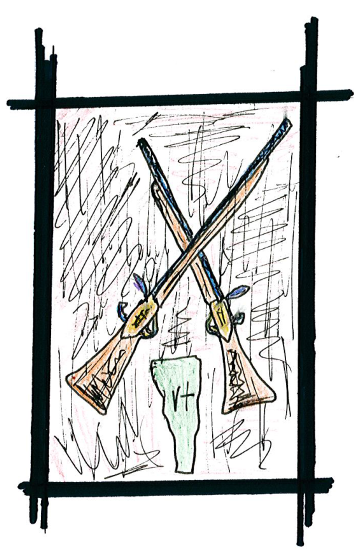
If we achieved all this, would not the forces in Washington act to support those among the elite who stand to lose out due to our freedom? Would not the American Empire refuse to let us traverse paths that diverge from their own? This would be a decision that Washington would make on its own. But let Vermonters recall that it was under just such duress that the old Republic of Vermont was first formed. Back then it was the Royal New York Colony that sought to corral our communities by force. This challenge was met and bested by the Green Mountain Boys. Later, during the American War of Independence, it was the British Empire that sought to put a lid on our growing democracy. And again, even though Vermont contained only 30,000 residents, and even though the English were considered the most powerful and populace empire of its day, common woodsmen and farmers rose up, electing their own officers, to deliver the Brits two major blows; the first being the taking of Fort Ticonderoga, the second being the English defeat at the Battle of Bennington. In other words, Vermont is not new to resisting the advances empires and states. And as in the past, Vermonters, if united, will inevitably rise, as will our allies among the working people and small farmers of the world, to whatever occasion our destiny demands.
Vermont As A Northern Star

While we struggle for freedom right here among our Green Mountains, we must understand that we are not alone. Millions of others, throughout the continent and beyond, are fighting for similar aims. Commonly such aims, direct democracy, farmer and worker self-management, and the guarantee that all people have access to the basic necessities and social services, is referred to as a libertarian form of socialism; namely that of anarchism. In an anarchist system, there is no longer a ruling class. Instead all people have an equal say in the direction of society. And again, this system differs from capitalism in that the products of labor are not geared to the interests of an elite few, but rather the common good of the whole.
As Vermonters, we must also recognize that the fight to win such freedom does not start and stop at our frontiers. As we write this document, millions of workers and farmers, in every corner of the continent and the world beyond, are struggling to achieve similar victories in their distinct regions. We would do well to support their efforts, as our fight is linked to theirs as long as we are engaged against the common enemy of greed, bureaucracy, centralization, capitalism, and the rich. The final defeat of capitalism will only come when its chain of oppression is broken at many links.
And again, when we achieve our victory, we must be prepared to extend our hand in friendship and cooperation with those farmers and workers beyond our mountains. We must do so in order that we, together, forge a new means of cooperation that seeks to achieve a broader society in which all people are free to experience the world without the deadening weights of poverty and alienation.
The Vermont Spring

As working class and farming Vermonters, we owe it to our cultural past, the future of our grandchildren, and ourselves to seek the fulfillment of our common dreams and aspirations. We can no more accept a future where our mountains are further masked by the two dimensional trappings of capitalism, then we could a world without seasons. Before consumerism, bureaucracy, and centralization obscure our culture of independence and equality, we must come together in order to reassert that which is just. For this we must continue to build the popular organizations that will inherit our hills, and we must build them so as they face the proverbial south. And for us, that is toward direct democracy, socialism, and creativity. In a word, we are a people who continually look toward the end of winter, and friends with a little hard work the spring will find us.
In Solidarity,
The Green Mountain Anarchist Collective (NEFAC-VT)
About The Authors
This document was penned in Vermont by David Van Deusen with the exception of ‘The Yoke Within’ which was penned by Sean West. All material was thoroughly reviewed, modified and approved by the Green Mountain Anarchist Collective. Members who reviewed the first edition of this document include Will Dunbar, Lady, Jonah M. This edition was reviewed and approved by Will Dunbar, Lady, and Xavier Massot. Original artwork by Xavier Massot.
The Green Mountain Anarchist Collective (GMAC) was co-founded by Xavier Massot, David Van Deusen, and Johnny Midnight in 2000, in Windham County, Vermont. GMAC was affiliated with the Northeastern Federation of Anarcho-Communists (NEFAC). GMAC produced the Teamster affiliated Catamount Tavern News, was active in organizing and supporting Black Blocs throughout the east following the Battle of Seattle, actively supported the Dairy Famers of Vermont, Montpelier Downtown Workers Union (UE Local 221), and the Peoples’ Round Table Organizing Committee, as well as various Vermont Workers Center efforts. GMAC also has successfully organized militant actions against fascism and the rightwing Minutemen.
David Van Deusen is a former member of ARA. He is a past District Vice President and Member-At-Large of the Vermont AFL-CIO & served on the Vermont Commission on Native American Affairs. David is also a former member of the United Auto Workers Local 1981, Teamsters Local 1L, United Electrical Workers Local 221, and co-authored the Black Bloc Papers. In addition, he was elected to two terms on his Select Board, and three terms as Constable. He is currently is a Senior Union Representative for state highway crew workers in Vermont & is a member of the Vermont Workers’ Center.
Sean West is formerly a Steward in the United Electrical Workers Local 221, Union Organizer, and member of the Vermont Workers’ Center. Sean now works performing manual labor, and lives in a collective household.
Lady is a former member of Anti-Racist Action, co-founded the Black Heart Anarchist Collective, and is a past member of the Vermont Workers’ Center. Lady now works as a paralegal.
Will Dunbar was an early member of the Second Vermont Republic (which he left when he joined the Green Mountain Anarchist Collective). He was a co-founder of a worker owned café in central Vermont and of the Northeast Kingdom Music Festival. Will is presently the proprietor of a tavern, frequented by workers and politicians, in Montpelier.
Xavier Massot is an artist and musician (co-founder of the band The Putnigs) residing in Montpelier. Xavier has worked as an archeologist. He is a past member of the Service Employees International Union Local 509, Teamsters Local 1L, the United Electrical Workers Local 255, and co-authored the Black Bloc Papers. Xavier, originally from Brittany-France, works as a butcher.
Vermont Demographics and Facts, 2014
Land Mass: 9,614 Square Miles
Publicly Owned Lands: 903,434 Acres (15.1%)
East-West Boarders: E-CT River, W-Lake Champlain
North-South Boarders: Mountains/Hills
Terrain: Mountainous
Forested Lands: 78.2%
Largest Predator: Catamount
Average Temperature: 43 Degrees Fahrenheit Above
Coldest Recorded Temperature: -50 Fahrenheit Below
Population: 626,011
State Capital: Montpelier, Pop. 7787
Number of Towns: 237
Number if Cities: 9
Territories-Unincorporated Towns: 5
Territories-Gores: 4, Combined Pop. 22
Largest City: Burlington, Pop. 42,417
Smallest Incorporated Town: Granby, Pop. 86
Size of Workforce: 350,800
Union Density (Represented Workforce): Aprx. 15%
Total Number of Farms: 7000
Dairy Farms: 995
Total Energy From Renewables: 25%
Total Electricity From Renewables: 51%
Electricity From In-State Renewables: 27%
Last Town to be Electrified: Victory, 1963
Homes That Heat With Wood: 16%
Percentage of Dirt Roads: 61%
Number Native American Tribes: 4
Size of Vermont National and State Guard: 4800
Number of Hunters: 75,000
Years as an Independent Republic: Fourteen-1775-1791
[1] Bernie Sanders also launched his candidacy for U.S. President openly as a Socialist in 2015.
[2] As of spring 2007, Vermonters stationed in occupied Iraq are being killed at a rate of six times the national State by State per capita average.
[3] In 2003, the major Vermont unions, through the Workers’ Center, passed a resolution condemning the invasion of Iraq.
[4] In 2006 this President, Dan Brush, was compelled to step down after his union, the Teamsters, decided to break with the AFL-CIO at the national level. However, the VT AFL-CIO remains a strong affiliate of the Workers’ Center, and continues to play a leading role in such progressive causes ‘ending the war in Iraq’ and ‘the establishment of a universal single payer healthcare system in Vermont.
[5] In 2005 the union changed its affiliation to the Industrial Workers of the World, renaming itself the Montpelier Workers’ Union, and becoming open to members outside the capital city.
[6] As of 2006, the union has gone dormant. However, the fact that the union was able to exert real power during two years of activity has demonstrated the basic effectiveness of this innovative model. Tellingly, while affiliated with the UE the union won a staggering 70% of its grievances despite not having the benefit of a legal contract in most of the shops where the grievances were fought. And again, in many cases the union was, among other things, able to win unjustly fired workers their jobs back. Politically, the union also helped to successfully defeat a town vote aimed at raising the local sales tax; a tax which the union viewed as being fundamentally regressive and representing a kind of pay cut for local employees who are compelled to purchase basic goods in town. While this particular union has gone dormant, it will live on as a model to be learned from and built on in future organizing campaigns.
[7] These cooperatives are workplaces that are owned and directly controlled by those that labor within them. In themselves they represent increasing instances of working class people coming together to exert direct democratic control over their occupational life and offer a limited glimpse as to what a freer system of labor would look like. As of July 2006, these cooperatives include Red House construction in Burlington, the Langdon Street Café in Montpelier, the Brattleboro Tech Collective, and the Common Ground restaurant both in Brattleboro.
[8] In the Fall of 2004, the Defense Squad voted to establish itself as an independent working class organization willing to come to the aid of any and all area workers/unions that requested such assistance. However, as of 2006 the Defense Squad in effect has been disbanded. Even so, it’s existence during the formative years of the Montpelier Downtown Workers’ Union helped prove that such an organization is possible. And again, the impressive 70% grievance victory rate of the union had a lot to do with the implicit threat that the Defense Squad represented to the elite business owners. Most Defense Squad members remain active within their unions and the Vermont Workers’ Center.
[9] It is also possible that this coming together of local unions will come about through participation in local AFL-CIO Central Labor Councils. Already the Washington-Lamoille-Orange County Central Labor Council, headed by Traven Leyshon, has a policy whereby any local union can affiliate into the group, even if they are not members of the AFL-CIO. Today [2007] this CLC not only includes AFL-CIO unions, but also the Teamsters.
[10] Establishing in-State electricity, and then energy self-sufficiency through community owned and worker run renewable energy projects, needs to be a top priority for a free Vermont. Our goal is not the socialism of darkness, but rather the equitable and democratic reconstruction of the best aspects of the modern era. Already, as of 2012, the State of Vermont, through Democratic/Working Families Party Governor, Peter Shumlin, has declared the goal of serving 90% of our energy needs from renewables by 2050. This move towards renewables is further demonstrated in the successful mass movement to shutdown Vermont’s sole nuclear power plant (and Vermont has no coal plants). As nuclear goes, wind farms and solar installations are already being built. A freer Vermont would be wise to make sure that any utility scale renewable plants are owned by the people, and run rationally by the workers, and supported by the town(s) they are located in. And of course family and community scale renewables should also contribute to our overall energy needs as much as possible.
[11] In some very small and/or cosmetic ways the recent establishment of local/community currencies such as ‘Burlington Bread’ can be seen as a nod in the direction of the labor hour model –circa 2006.
[12] The relative difference of pay regarding novice, journeymen, master, and workers whose jobs entail serious danger (potentially making four times more than the lowest paid worker) may sound like a big difference, but when one considers the massive disparity of earnings and wealth that exists currently under the capitalist model (a model through which 10% of the population control 90% of the wealth, and where one man, Bill Gates, has sixty billion dollars while ten thousand men and women –the approximate total population of Barre!- are homeless and penniless in Los Angeles, CA), one begins to see how a four tiered labor hour system would result in relative economic parity. Here such a system of parity would also guarantee the ability of society to provide all its residents with a dignified set of social services and human benefits. To put it simply, the fruit of our labor would no longer get lost in the bank accounts of the elite.
[13] Like the Town Meeting movement towards more local democracy, the modern struggle for Abenaki rights is also a relatively new development. Following hundreds of years of extreme oppression, including a forced sterilization program in the twentieth century, the Abenaki sparked the current drive towards justice as recent as the 1970s, on the heels of the continent wide American Indian Movement. This epic fight for survival is still some time off in reaching its full maturity –and thus victory!